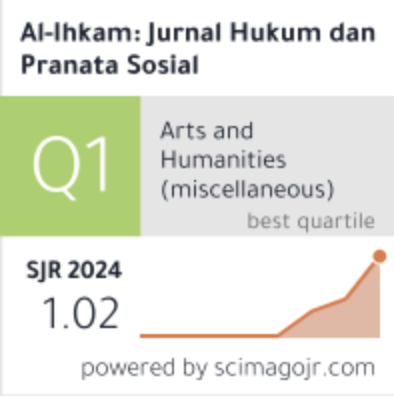Ighlāq al-Masājid Man’an lī intishār Fayrūs Corona Dirāsah Taḥlīlīyah fī Ḍaw’ Maqāṣid al-Sharī`ah
 Abstract views: 558
,
Abstract views: 558
,
 PDF downloads: 1036
PDF downloads: 1036
Abstract
Many Muslim countries prohibit mosques opening because social gathering is regarded as a high probable factor for Corona Virus infection. This paper discusses different opinions of some contemporary scholars on this issue from the Maqāṣidī perspective. It adopts an analytical method to explain the opinions. Findings show that contemporary scholars are of two group: The first group permits the mosques’ closure for realizing the divine objective concerning to life protection out of danger. The second thinks that the mosques’s closure amounts to suspension of congregational prayer as one of Islamic essential exterior rites. The findings illustrate that the life protection constitutes a necessary benefit because putting life in danger is a very serious harm. The life protection is more important than congregational prayer’s objective which complements the necessary objective of religious protection. Moreover, it shares the spirit with the principle saying that any means to achieving what is compulsory also becomes compulsory accordingly. Above all, prohibition of congregational prayer is just a momentary legal permit due to a necessity on its merit the research recommends that religious institution should make people aware to take all measures in stopping the spread of Covid-19 pandemic.
أمرت كثير من الدول الإسلامية بإغلاق المساجد باعتبار أن التجمع فيها يمثل سببا محتملا لوقوع العدوى. تهدف الورقة إلى مناقشة آراء العلماء المعاصرين وأدلتهم تجاه هذه القضية وتحليلها في ضوء مقاصد الشريعة. استخدمت الورقة المنهج التحليلي في بيان آراء العلماء المعاصرين والموازنة بين المقاصد. أظهرت نتائج الورقة أن العلماء المعاصرين منقسمون إلى قسمين: فطائفة ترى جواز إغلاق المساجد؛ لأنه يحقق مقصود الشارع في حفظ النفوس من الهلاك، وطائفة أخرى ترى أن هذا الإغلاق تعطيل لشعيرة صلاة الجماعة التي هي شعيرة من شعائر الإسلام الظاهرة. كما أوضحت النتائج أن مصلحة حفظ النفس تمثل مقصدا ضروريا وفوات الأنفس ضرر لا يمكن جبره؛ وهو أقوى في مرتبته من مقصد الصلاة جماعة من حيث إنه في مرتبته مكمل لضروري حفظ الدين. وأن تعطيل الجماعة في الصلاة يمثل رخصة مؤقتة ولضرورة تقدر بقدرها، ولأنها شعار المسلمين، فهو مصلحة مكملة لضروري حفظ الدين، وعليه فالتعارض واقع بين مقصدين متفاوتين في المرتبة، وعليه، فالقول بفتوى غلق المساجد أرجح باعتبار تحقيق المناط؛ ولأنه يحقق مقاصد الشريعة العليا المتمثلة في حفظ الأنفس المعصومة من الهلاك في الجملة. وتوصي الورقة المؤسسات الدينية بالقيام بتوعية الناس بأهمية اتخاذ التدابير الاحترازية لمنع تفشي هذه الجائحة العالمية "كوفيد-19".
Downloads
References
Abū Ya’lā Aḥmad bin `Alī bin Mutsna bin Yaḥya bin ‘Isā bin Ḥilāl al-Tamīmī, Musnad Abi Ya’lā, Tahqiq: Ḥusain Sālim Asad, Damaskus: Dar al-Ma’mun li at-Turats, 1984.
Aḥmad bin `Alī bin Ḥajar Abū al-Faḍl al-Asqalānī, Fatḥ al-Bārī Sharḥ Ṣaḥīḥ al-Bukhārī, Beirut: Dar al-Ma’rifat, 1379.
Muḥammad bin Ismā’īl Abū `Abd Allah Al-Bukhārī, al-Jāmi’ al-Musnad al-Ṣaḥīh, Beirut: Dar Najah, 1422.
Abū Ḥāmid Muḥammad bin Muḥammad Al-Ghazālī, al-Mustaṣfā, Beirut: Dar al-Kutub al-‘Ilmiyyah, 1993.
Fakhr al-Dīn al-Rāzī, al-Mahṣūl fi ‘Ilm Uṣul al-Fiqh, Beirut: Mu’assasah al-Risalah, 1997.
Ibrāhīm bin Mūsā Al-Shaṭibī, al-Muwāfaqāt, Riyadh: Dar Ibnu ‘Affan, 1997.
Jalāl al-Dīn al-Suyūṭi, al-Ashbah wa al-Naẓā’ir, Beirut: Dar al-Kutub al-‘Ilmiyyah, 1990.
Muḥammad Ṣidqī bin Aḥmad bin Muḥammad Al-Borneo, Mawsū’ah al-Qawā’id al-Fiqhiyyah, Beirut: Mu’assasah al-Risalah, 2003.
Asnawi, `Abd al-Raḥīm bin al-Ḥasan al-Asnawī,, Nihāyah al-Sūl Sharḥ Minhāj al-Wuṣūl, Beirut: Dar al-Kutub al-‘Ilmiyyah, 1999.
Ibn `Amir al-Hajj, al-Taqrīr wa al-Taḥbīr, Beirut: Dar al-Kutub al-‘Ilmiyyah, 1983.
Abu al-Hasan Ali bin Khalaf bin `Abd Malik Ibn Baṭāl, Sharḥ Ṣaḥīḥ al-Bukhārī li Ibn al-Baṭāl, Riyadh: Maktabah Rusyd, 2003.
Taqī al-Dīn Aḥmad bin `Abd al-Ḥalim Ibn Taymiyah, Majmū’ al-Fatāwā, al-Riyadh: Maktabah ‘Abikan, 1319.
Mas’ūd Ṣabrī, Fatāwa al-‘Ulamā’ Hawl Fairūs Kūrūna, Qahirah: Dar al-Basyir, 2020.
Muḥammad bin Aḥmad bin Muḥammad bin `Abd Allah Ibn Juzai, al-Qawanin al-Fiqhiyyah.
Al-Amīr `Ala’ al-Dīn bin Balbān al-Fārisī, al-Iḥsān fi Taqrīb Ṣaḥīḥ Ibn Hibbān, Beirut: Mu’assasah al-Risalah, 1988.
Muḥammad bin Ismā’īl bin Ṣalāḥ bin Muḥammad al-Ḥusnī, Uṣūl al-Fiqh al-Musammā Ijābah al-Sā’il Sharḥ Bughyah al-’Āmil, Beirut: Mu’assasah al-Risalah, 1986.
Muḥammad bin Yūsuf bin Abī al-Qāsim bin Yūsuf al-‘Abdarī al-Ghurnaṭī, al-Tāj wa al-Iklīl li Mukhtaṣar al-Khalīl, Beirut: Dar al-Kutub al-‘Ilmiyyah, 1994.
Muslim bin al-Ḥajjāj al-Qusyayri al-Naysabūrī, Ṣaḥīḥ Muslim, Qahirah: Dar Ihya’ al-Kutub al-Arabiyyah al-Aisi al-Baabi al-Hali wa Syirkah, 1991.
Sulaymān bin Aḥmad bin Ayyūb bin Muṭīr al-Lakhmī al-Syāmī Abū al-Qāsim al-Ṭabrānī, al-Mu’jam al-Kabīr, Qahirah: Maktabah Ibnu Taimiyah, 1994.
In order to be accepted and published by Al-Ihkam: Jurnal Hukum dan Pranata Sosial, author(s) submitting the article manuscript should complete all the review stages. By submitting the manuscript, the author(s) agreed to the following terms:
- The copyright of received articles shall be assigned to Al-Ihkam: Jurnal Hukum dan Pranata Sosial as the publisher of the journal. The intended copyright includes the right to publish articles in various forms (including reprints). Al-Ihkam: Jurnal Hukum dan Pranata Sosial maintain the publishing rights to the published articles.
- Authors are permitted to disseminate published articles by sharing the link/DOI of the article at Al-Ihkam: Jurnal Hukum dan Pranata Sosial. Authors are allowed to use their articles for any legal purposes deemed necessary without written permission from Al-Ihkam: Jurnal Hukum dan Pranata Sosial with an acknowledgment of initial publication to this journal.
- Users/public use of this website will be licensed to CC-BY-SA.



.png)
_1.png)


_page-00011.jpg)


